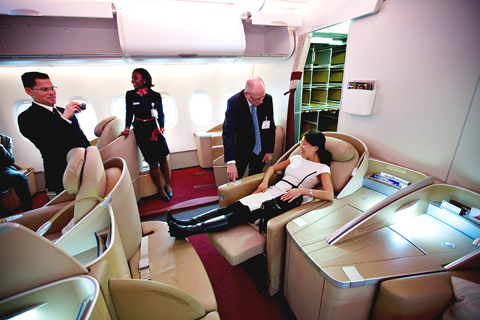The world’s largest airliner, an Air France A380, touched down in New York on Friday after completing the superjumbo jet’s first Atlantic crossing from Europe to the US.
The Airbus plane, carrying 538 passengers, left Paris earlier in the day and landed at 1:07pm at JFK Airport, several minutes ahead of schedule, under crisp blue skies.
Air France is the first European airline to put the giant aircraft into service, but the fourth worldwide after Singapore Airlines, Gulf-based Emirates and Qantas of Australia.

PHOTO: BLOOMBERG
Passengers included 380 people who bought their tickets in an Air France auction to benefit disadvantaged children.
Air France will launch regular A380 flights across the Atlantic tomorrow. The fleet of 12 huge planes will also serve Johannesburg, starting in February, and then Tokyo.
But major production and delivery delays mean the commercial success of the A380, the pride of Airbus and parent company EADS, has yet to be secured.
Meanwhile, US aerospace giant Boeing broke ground on Friday for the second assembly plant for its new 787 Dreamliner aircraft scheduled for its first test flight by the end of the year.
The facility at North Charleston, South Carolina, will also have the capability to support the testing and delivery of airplanes, officials said.
Jim Albaugh, president and chief executive of Boeing Commercial Airplanes, said Friday’s launch “marks the beginning of an expansion plan that will strengthen the 787 program.”
“Locating the second line in North Charleston will allow Boeing to successfully compete in the aerospace market and grow for the long-term benefit of many stakeholders,” he said.
Boeing said last week that its 787 Dreamliner aircraft remains on track for its first test flight by the end of the year.
On June 23, Boeing announced a fifth delay in the 787 Dreamliner program to fix a structural problem.
Fifty-five customers around the world have ordered 840 787s since the program was launched in April 2004, making the Dreamliner the fastest-selling new commercial jetliner in history, the company said.

When Lika Megreladze was a child, life in her native western Georgian region of Guria revolved around tea. Her mother worked for decades as a scientist at the Soviet Union’s Institute of Tea and Subtropical Crops in the village of Anaseuli, Georgia, perfecting cultivation methods for a Georgian tea industry that supplied the bulk of the vast communist state’s brews. “When I was a child, this was only my mum’s workplace. Only later I realized that it was something big,” she said. Now, the institute lies abandoned. Yellowed papers are strewn around its decaying corridors, and a statue of Soviet founder Vladimir Lenin

UNCERTAINTIES: Exports surged 34.1% and private investment grew 7.03% to outpace expectations in the first half, although US tariffs could stall momentum The Chung-Hua Institution for Economic Research (CIER, 中華經濟研究院) yesterday raised its GDP growth forecast to 3.05 percent this year on a robust first-half performance, but warned that US tariff threats and external uncertainty could stall momentum in the second half of the year. “The first half proved exceptionally strong, allowing room for optimism,” CIER president Lien Hsien-ming (連賢明) said. “But the growth momentum may slow moving forward due to US tariffs.” The tariff threat poses definite downside risks, although the scale of the impact remains unclear given the unpredictability of US President Donald Trump’s policies, Lien said. Despite the headwinds, Taiwan is likely

UNIFYING OPPOSITION: Numerous companies have registered complaints over the potential levies, bringing together rival automakers in voicing their reservations US President Donald Trump is readying plans for industry-specific tariffs to kick in alongside his country-by-country duties in two weeks, ramping up his push to reshape the US’ standing in the global trading system by penalizing purchases from abroad. Administration officials could release details of Trump’s planned 50 percent duty on copper in the days before they are set to take effect on Friday next week, a person familiar with the matter said. That is the same date Trump’s “reciprocal” levies on products from more than 100 nations are slated to begin. Trump on Tuesday said that he is likely to impose tariffs

HELPING HAND: Approving the sale of H20s could give China the edge it needs to capture market share and become the global standard, a US representative said The US President Donald Trump administration’s decision allowing Nvidia Corp to resume shipments of its H20 artificial intelligence (AI) chips to China risks bolstering Beijing’s military capabilities and expanding its capacity to compete with the US, the head of the US House Select Committee on Strategic Competition Between the United States and the Chinese Communist Party said. “The H20, which is a cost-effective and powerful AI inference chip, far surpasses China’s indigenous capability and would therefore provide a substantial increase to China’s AI development,” committee chairman John Moolenaar, a Michigan Republican, said on Friday in a letter to US Secretary of